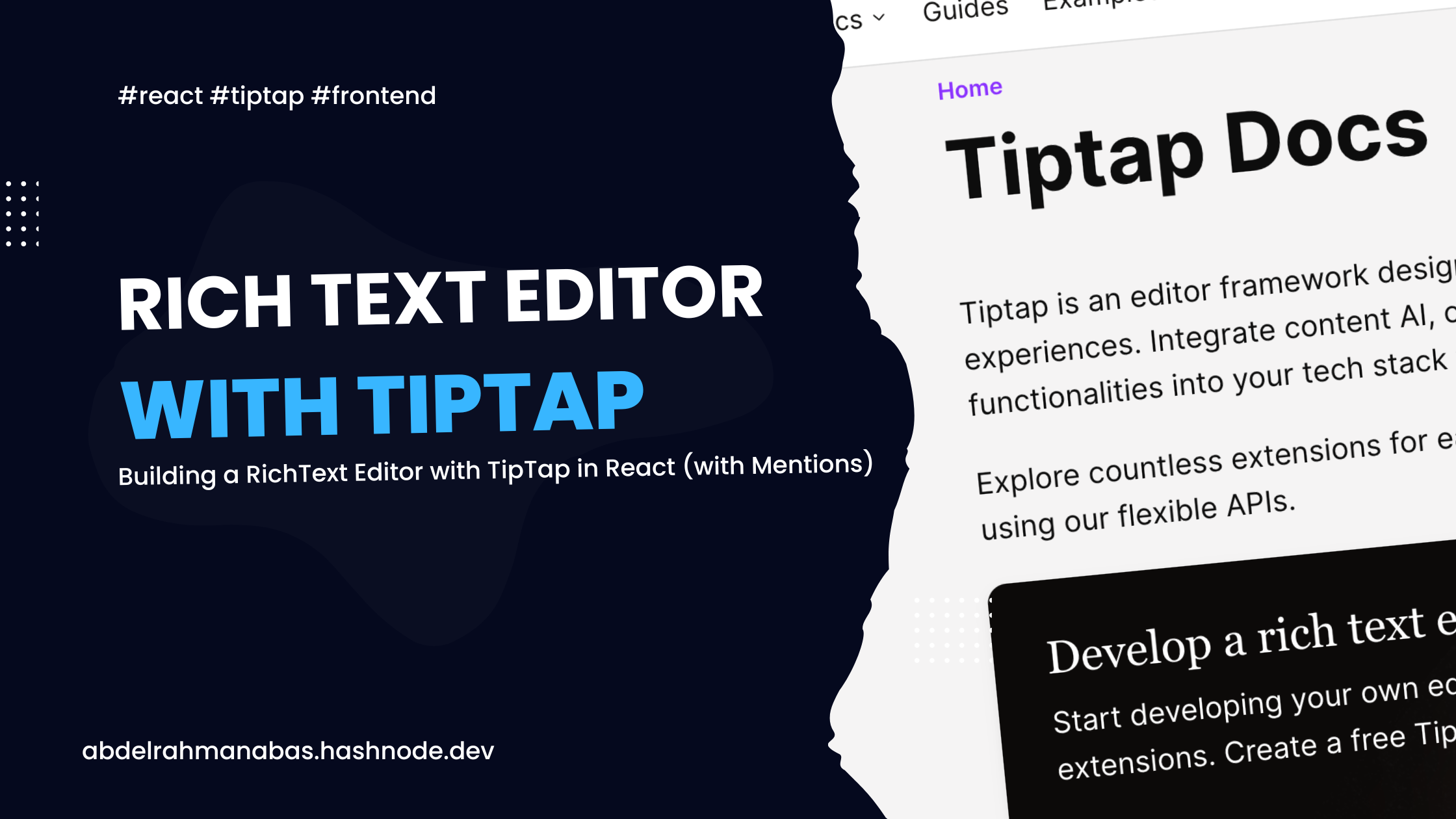Building a RichText Editor with TipTap in React (with Mentions)
 Abdelrahman Ahmed
Abdelrahman AhmedTable of contents

If you want to enhance your React app with a powerful, customizable RichText editor, TipTap is an excellent choice. This tutorial will guide you through integrating TipTap into your project and adding a mentions feature for a dynamic user experience.
What You’ll Build
By the end of this tutorial, you’ll have:
1. A fully functional RichText editor built with TipTap.
2. Support for mentions triggered by @, complete with dynamic suggestion lists.
3. Insight into resolving edge cases like placeholder visibility and cursor preservation.
For more on TipTap, visit the official documentation or explore their GitHub repository.
Step 1: Install Dependencies
Before diving in, install the required libraries:
npm install @tiptap/react @tiptap/starter-kit @tiptap/extension-mention
Step 2: Create a Basic RichText Editor
Start by creating a RichTextEditor component. Here’s a simple implementation:i
import { useEditor, EditorContent } from '@tiptap/react';
import StarterKit from '@tiptap/starter-kit';
export const RichTextEditor = ({ content, onChange }) => {
const editor = useEditor({
extensions: [StarterKit],
content: content,
onUpdate: ({ editor }) => {
onChange(editor.getHTML());
},
});
return <EditorContent editor={editor} />;
};
Step 3: Add Mentions
Mentions enhance user interactivity, especially in chat or collaborative applications. To implement them:
1. Install and Configure the Mention Extension
Modify the RichTextEditor component to include the Mention extension:
import Mention from '@tiptap/extension-mention';
export const RichTextEditor = ({ content, onChange, mentions }) => {
const editor = useEditor({
extensions: [
StarterKit,
Mention.configure({
HTMLAttributes: { class: 'mention' },
suggestion: {
items: ({ query }) =>
mentions.filter(item => item.display.toLowerCase().includes(query.toLowerCase())).slice(0, 5),
render: () => {
let component;
let popup;
return {
onStart: (props) => {
popup = document.createElement('div');
popup.className = 'mention-popup';
document.body.appendChild(popup);
component = {
updateProps: () => {
popup.innerHTML = `
<div class="items">
${props.items.map(item => `
<button class="item ${item.selected ? 'is-selected' : ''}">${item.display}</button>
`).join('')}
</div>
`;
},
destroy: () => popup.remove(),
};
popup.addEventListener('click', (e) => {
const button = e.target.closest('button');
if (button) {
const index = Array.from(popup.querySelectorAll('.item')).indexOf(button);
props.command({ id: props.items[index].id, label: props.items[index].display });
}
});
component.updateProps();
},
onExit: () => component?.destroy(),
};
},
},
}),
],
content,
onUpdate: ({ editor }) => onChange(editor.getHTML()),
});
return <EditorContent editor={editor} />;
};
Step 4: Style the Mentions Popup
Mentions should be visually distinct. Add the following styles to enhance usability:
.mention-popup {
background: white;
border-radius: 8px;
box-shadow: 0px 2px 8px rgba(0, 0, 0, 0.1);
padding: 8px;
position: absolute;
z-index: 1000;
}
.mention-popup .items {
display: flex;
flex-direction: column;
}
.mention-popup .item {
padding: 8px;
cursor: pointer;
border-radius: 4px;
}
.mention-popup .item:hover,
.mention-popup .item.is-selected {
background: #f0f0f0;
}
Step 5: Edge Cases I Faced During Implementation
1. Cursor Jumping:
To avoid cursor jumping while typing, ensure content updates preserve the cursor’s position:
const editor = useEditor({
extensions: [StarterKit],
content,
onUpdate: ({ editor }) => {
const selection = editor.state.selection;
onChange(editor.getHTML());
editor.commands.setTextSelection(selection);
},
});
2. Placeholder Not Visible:
Use the Placeholder extension to display a hint when the editor is empty:
import Placeholder from '@tiptap/extension-placeholder';
const editor = useEditor({
extensions: [
StarterKit,
Placeholder.configure({ placeholder: 'Type something...' }),
],
});
3. Mention Suggestions Not Showing:
Check the suggestion.items method to ensure it filters and returns the expected list.
Step 6: Integrate into Your App
Wrap the editor in a modal or form component to make it part of a larger feature, such as notifications or comments. Here’s an example:
import React from 'react';
const NotificationForm = ({ mentions, onSubmit }) => {
const [content, setContent] = React.useState('');
return (
<form onSubmit={() => onSubmit(content)}>
<RichTextEditor content={content} onChange={setContent} mentions={mentions} />
<button type="submit">Send</button>
</form>
);
};
Conclusion
With TipTap, you can build a RichText editor that’s both powerful and user-friendly. Adding mentions enhances the interactivity of your app, making it more engaging for users.
For more, visit the official TipTap website. Did you learn something new from this article? Let me know in the comments! 🎉
Subscribe to my newsletter
Read articles from Abdelrahman Ahmed directly inside your inbox. Subscribe to the newsletter, and don't miss out.
Written by
